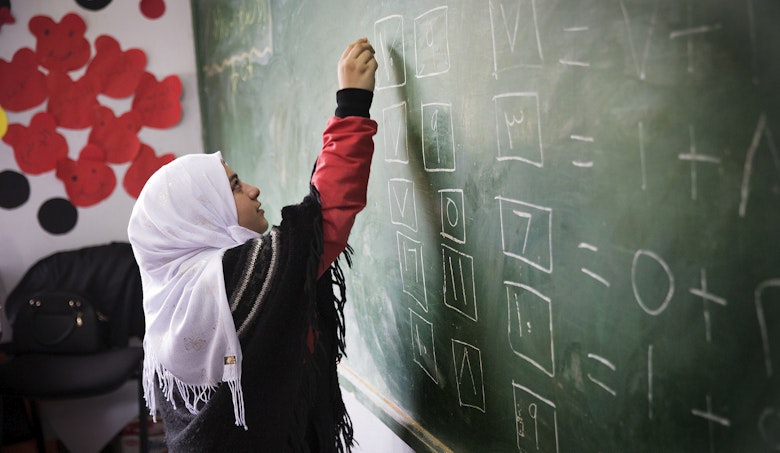Lebanon
Our work in Lebanon
We have been in Lebanon since 2019, providing different services for vulnerable children and their families from both Lebanon as well as from Syria. Children can experience traumatic things and have all their daily activities and connections disrupted. They miss their normal life. Their school. Their friends. It is important that they are well protected and helped.
In 2019, the “Back to the Future” project provided a protective and nurturing environment to increase access to school, inclusion and retention for Syrian refugee children impacted by war, and to vulnerable Lebanese.
We provided a safe place for children. They received special psychosocial help and education in child-friendly spaces. Together with their families and communities, they can process their difficult experiences and learn to deal with their new circumstances. They can also make up for missed school lessons.
We help as many children as possible
On the 4th August 2020, the Lebanese capital, Beirut, was struck by an explosion leaving thousands of people injured, and tens of thousands of families instantly homeless. Children have lost their parents, and food and medicine supplies have been disrupted.
From day 1, Terre des Hommes immediately started working to assess the needs of children, and provide emergency aid to affected children and their families. We provided psychological support and recreational activities. The psychological sessions provided stress-relieving games that could be recreated at home without extra financial expenses for the family members to play together. “I don’t have toys at home” mentions one of the project participants. “We play the game of the chairs. All the children have the right to play these games”.
We also distributed cash and hygiene kits in the most affected neighbourhoods, and helped children get back to school.
She Leads Lebanon
In Lebanon, social and gender norms, shrinking civic space, and discriminatory laws contribute to upholding gender inequalities and discourage girls and young women from speaking out. Formal and informal youth-led organisations and women-led organisations are facing a growing pressure from discriminatory social institutions, political figures, and religious leaders, that restrict their access to resources and opportunities.
Terre des Hommes uses a gender transformative approach that aims at eliminating the structural barriers to gender equality, tackling the root causes of gender inequalities, working at all levels.
Results
The results we achieved till now (mid 2024) include the following:
Total people reached: 4,389. Including:
- Psychological First Aid (PFA) for Children: 595 beneficiaries reached
- PFA for Caregivers: 245 beneficiaries reached
- Psychosocial support (PSS) for Children: 391 beneficiaries reached
- Community Based PSS for Children: 523 beneficiaries reached
- Caregivers Support Program: 293 beneficiaries reached
- Individual Counselling: 373 beneficiaries reached
- Case Management: 108 beneficiaries reached
- Emergency Cash Assistance: 85 beneficiaries reached
- Multi-Purpose Cash Assistance: 55 HHs reached (296 individuals)
- Awareness on Child Protection: 433 beneficiaries reached
- Awareness on Covid-19: 1,101 beneficiaries reached
- Hygiene Kits Distribution: 514 beneficiaries reached
Our programmes
Completed
Back to the Future
21.700 refugee and local vulnerable children received educational support. Hundreds of thousands of refugee ch…
Ongoing
Humanitarian action
Humanitarian emergencies, such as those resulting from armed conflicts, natural disasters, climate change, and…
Ongoing
She Leads
The She Leads programme fights for the rights, leadership and agency of girls and young women (GYW). It is an…
Our partners in Lebanon
Together with experienced partners we are working towards a world without child exploitation, where young people can feel safe today and better about tomorrow. Join our fight.
Contact us
Business hours
Latest news
She Leads advocates push for climate action at the UN Human Rights Council
Climate change is causing an alarming amount of loss and harm to people's lives and means of subsistence world…
Annual report 2023
In 2023, we collaborated with many stakeholders to work with us towards our ultimate goal; stopping child expl…
The Global Research Agenda
On February 1 2024, the Terre des Hommes Netherlands Global Research Agenda was launched, which will guide our…
She Leads Mid-Term Review (2023)
The She Leads Mid-Term Review is an assessment of the progress of She Leads as we are halfway our 5-year progr…
Call for immediate ceasefire and humanitarian support in Gaza and the West Bank
Terre des Hommes is providing humanitarian and development assistance in Gaza and the West Bank through its In…
Annual report 2022: concrete results for children
Thanks to the support of donors, in collaboration with partners and the commitment of volunteers and staff, Te…
She Leads activists plead for digital opportunities at UN in New York
Give girls the same opportunities as boys, even when it comes to digital accessibility. This is the message of…
She Leads at the UN Human Rights Council
Youth advocates from the She Leads program participate in the 50th session of the UN Human Rights Council. Sev…
Tailor-made educational support for Bilal in Lebanon
Five-year-old Bilal* is beaming in the classroom of the Early Childhood Education (ECE) programme. He is one o…
Picturing a childhood on paper
Art, in any shape or form, can transform a child’s life. For 13-year-old Walid, drawing has become an essentia…
Annual report 2020
Without a doubt 2020 is the year of the corona pandemic. And yet there is much to be proud of!
Annual Report 2019
Together we make the difference. A fitting title for our annual report 2019. We are proud of the results we re…

